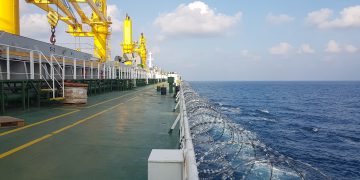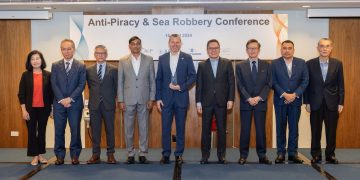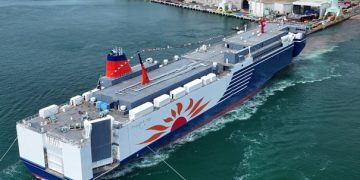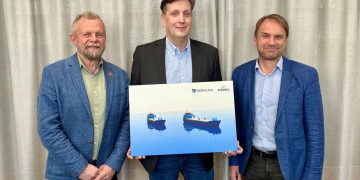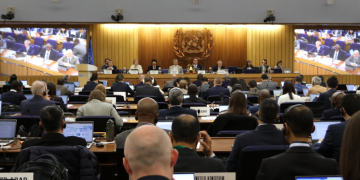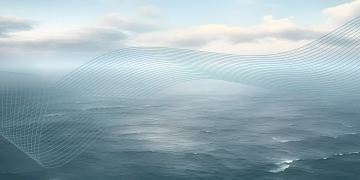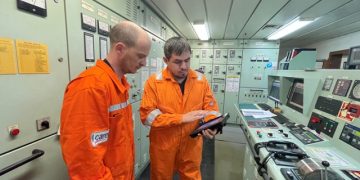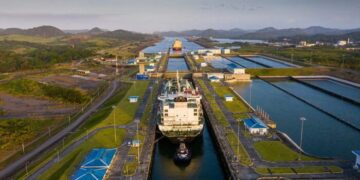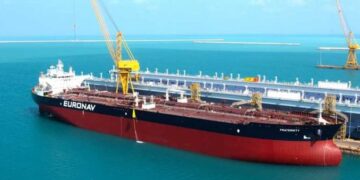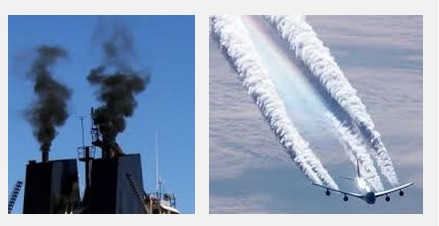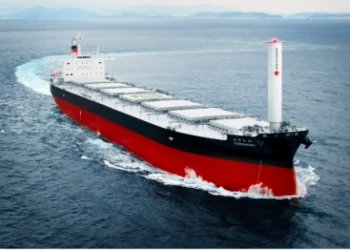 Mr. Julien Dufour, CEO, Verifavia Shipping, comments current developments regarding the inclusion of shipping in ETS and stresses that regardless the offsetting scheme is finally run by either IMO or an ETS, it is important for the industry not to deviate from the initial object; the reduction of the GHG emissions from shipping. Mr Dufour shares his long experience from the aviation industry to describe what an EU ETS for shipping would mean, noting that it will be definitely a ‘complex process’.
Mr. Julien Dufour, CEO, Verifavia Shipping, comments current developments regarding the inclusion of shipping in ETS and stresses that regardless the offsetting scheme is finally run by either IMO or an ETS, it is important for the industry not to deviate from the initial object; the reduction of the GHG emissions from shipping. Mr Dufour shares his long experience from the aviation industry to describe what an EU ETS for shipping would mean, noting that it will be definitely a ‘complex process’.
GREEN4SEA: How have IMO’s decisions at MEPC70 on CO2 shipping emissions affected the current legislative landscape? How do IMO’s plans differ from the EU MRV system?
Julien Dufour: The EU MRV system was designed to contribute to building an international system and calls for alignment continue to be voiced. At present, it is unclear if this will happen. However, what is clear is that – before launching any public consultation – the European Commission (EC) requires the guidelines from IMO to be published so that all the necessary information about the functioning of the IMO data collection system is available. Moreover, the European Commission continues to put pressure on the IMO by stipulating that if it doesn’t implement an international market based measure for shipping by 2023, then it will consider including EU MRV in the Emission Trading Scheme. So, until the IMO agrees on the effective implementation of a global market based measure for shipping emissions, the EU MRV will continue.
The key differences of note between the IMO and EU MRV systems include:
- The EU MRV regulation requires reporting of actual cargo carried onboard, fuel consumed, and CO2 emitted, whereas the IMO only requires reporting of fuel consumed
- For EU MRV, calculations are made by the shipping companies and verified by an accredited verifier. For IMO, the calculations are verified by the administration, according to national procedures
- The EU plans to make this information publicly available whereas, for IMO, the raw data will only be available to IMO and flag states who will then share aggregated anonymised data.
As with any new complex process or regulation, implementation requires time. This means that as it stands, the two systems will run in parallel for at least the next few years, and for those vessels calling at EU ports during 2019 and beyond, both regulations will have to be complied with.
G4S: Do you think that there will be any drawback associated with the decision to introduce IMO global MRV with respect to EU MRV and possible EU ETS?
J.D.: The main drawback seems to be that shipping companies are delaying starting the compliance process because they believe that the IMO will either overrule EU MRV, or that the two systems will soon be aligned. However, based on the IMO’s recent decision at MEPC70, it’s clear that the two reporting systems will run in parallel for the foreseeable future. This means that shipping companies must get ready now for compliance with the first EU MRV legal deadline in August of this year, as well as preparing to comply with the IMO’s requirements.
With regards to EU ETS, this is still a long way ahead and – taking lessons from aviation – it would be a complex process to try and integrate shipping. What is important to note, however, is that regardless of whether we’re talking about an offsetting scheme which is run by IMO or an ETS designed by the EU, the process still begins with robust data collection and the overall objective is still to reduce greenhouse gas emissions from shipping.
G4S: What should the key priorities for the shipping industry be in relation to EU MRV Regulation? How can your organization be of assistance towards that end?
J.D.: EU MRV regulation will see the EU collect and make publicly available data for over 12,000 vessels calling at EU ports on or after 1st January 2018 to load or unload cargo, or embark or disembark passengers for commercial purposes. The regulation requires vessels exceeding 5,000 gross tonnage (GT) and operating in the EU, to prepare monitoring plans describing the procedures they will use to monitor and report their carbon emissions and transport work.
The Monitoring Plan must be submitted to an accredited verification body by 31st August 2017 and successfully assessed by 31st December 2017, before the start of the first monitoring period. The emissions and transport work data for 2018 must then be consolidated in an annual report, which must be verified by an accredited verifier by 30th April 2019. Once this is done, the report must be submitted to the European Commission and the Flag State, and the vessel should carry onboard the document of compliance from June 2019.
Verifavia Shipping expects to be fully accredited by UKAS on 1st March, making it one of the very first fully accredited global verifiers. Our team of EU MRV experts will continue to diligently work with ship owners and operators on all matters relating to EU MRV verification, including preparation for compliance with the first legal deadline just six months away.
G4S: Why is it important for ship-owners and operators to plan early in order to lower shipping emissions? What are the benefits?
J.D.: The shipping industry remains under increasing scrutiny and pressure to play its part in lowering carbon emissions from maritime transport. The EU MRV regulation which came into force on 1st July 2015 brings us a step closer towards that goal. However, the first regulatory deadline is on 31st August 2017, by which time, ship owners and operators have to prepare a monitoring plan and submit it to an accredited verifier. In this plan they have to detail the procedures in place to monitor and report the fuel consumption, carbon emissions, transport work, and activity data on all voyages to, from, and between European ports. With most of the technical details of the regulation already agreed legally or at working group level, there is enough information available for ship operators to start MRV today and avoid the anticipated MRV verification bottleneck expected in Q4 2017. The monitoring report and emissions report templates have been released by the European Commission, as have the rules for verification, the rules for the accreditation of verifiers, and the rules for recording transport work. So, ship owners should start to work towards compliance now. The deadline is six months away and, as with any complex legislation, it makes sense to allow enough time to identify and address any issues ahead of time.
G4S: What do you think may be the immediate and long term consequences of a possible introduction of an EU ETS for shipping? Are there any lessons to be learned from the aviation industry?
J.D.: The best lesson the aviation industry taught us with regards to an EU ETS introduction is the complexity in setting it up. Specifically, the logistics involved in getting it off the ground, as well as getting the procedures in place both for the EC and for member states. Another issue that could arise is the notion of the EU ETS being viewed by non-EU member states as an introduction of an ‘extra territorial regulation’, which again was experienced by the aviation industry. This could create tension and opposition internationally because an ‘extra territorial regulation’ has the ability to impose tax on emissions that are strictly speaking outside of EU borders, as it includes all emissions from the last port of call to the first.
G4S: What would be your key message to the industry in general with respect to CO2 reduction from shipping emissions?
J.D.: Even if some harmonisation between the IMO and EU MRV systems is initiated in the future, it remains advisable for ship owners and operators to prepare for the first MRV deadline of 31st August 2017 ahead of time. By examining monitoring and reporting obligations for vessels, as well as shore systems and routines, gaps can be identified and addressed in sufficient time to enable timely and effective compliance. Ultimately – like it or loathe it – compliance with this regulation is mandatory and any ship owners that are not compliant will be penalised.
The views presented hereabove are only those of the author and not necessarily those of GREEN4SEA and are for information sharing and discussion purposes only.
[divider]
About Julien Dufour, CEO, Verifavia Shipping
 Julien Dufour is a transport and environmental auditor, verifier, researcher and speaker with 20 years’ experience in the transport sector and eight years’ experience in carbon emissions monitoring, reporting, and verification. He is the Founder and CEO of Verifavia and Verifavia Shipping, the worldwide independent carbon emissions verification bodies for aviation and maritime transport. Verifavia Shipping provides carbon emissions verification services that enable shipping companies to navigate the requirements of the EU Shipping Monitoring, Reporting and Verification (MRV) Regulation efficiently and effectively. By invitation of the European Commission, Julien is an active member of the Commission’s groups of experts on EU MRV, under the European Sustainable Shipping Forum (ESSF). He is also Task Leader of the Commission’s Task Force on the verification of the emissions report, responsible for drafting the relevant guidance document, and a member of the task forces on the preparation and assessment of the Monitoring Plan.
Julien Dufour is a transport and environmental auditor, verifier, researcher and speaker with 20 years’ experience in the transport sector and eight years’ experience in carbon emissions monitoring, reporting, and verification. He is the Founder and CEO of Verifavia and Verifavia Shipping, the worldwide independent carbon emissions verification bodies for aviation and maritime transport. Verifavia Shipping provides carbon emissions verification services that enable shipping companies to navigate the requirements of the EU Shipping Monitoring, Reporting and Verification (MRV) Regulation efficiently and effectively. By invitation of the European Commission, Julien is an active member of the Commission’s groups of experts on EU MRV, under the European Sustainable Shipping Forum (ESSF). He is also Task Leader of the Commission’s Task Force on the verification of the emissions report, responsible for drafting the relevant guidance document, and a member of the task forces on the preparation and assessment of the Monitoring Plan.






